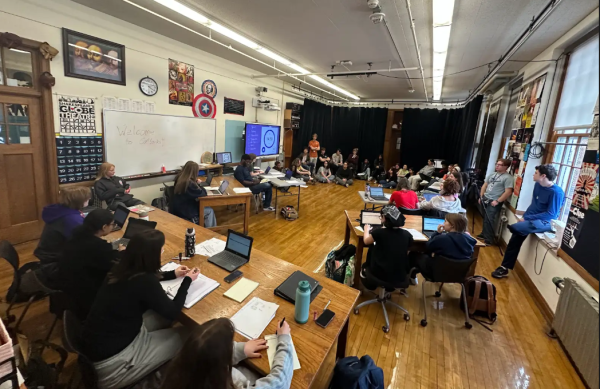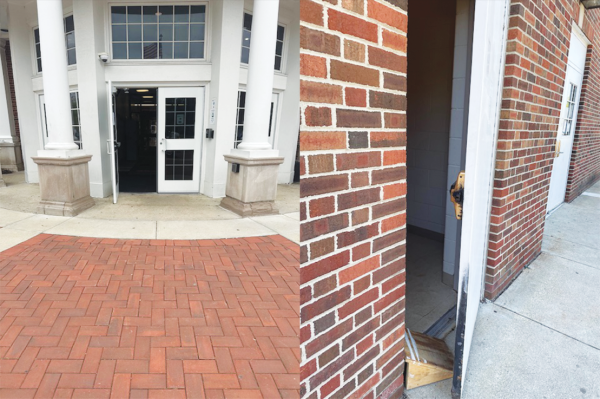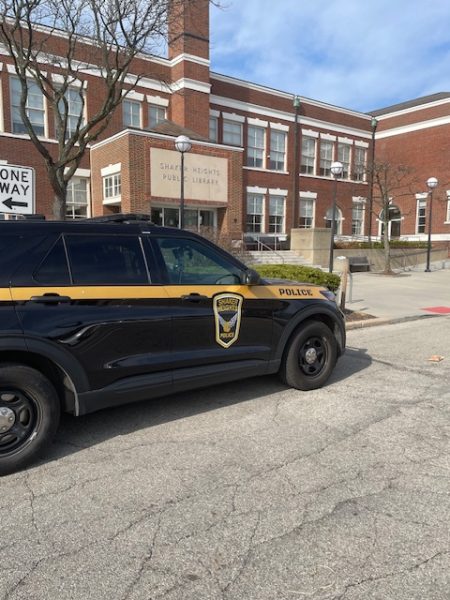‘They shouldn’t need to learn it from me’
Jennie Reiff (’95) asks what steps the district is taking to prevent another instance of the sexual assault she endured
Former social studies teacher Timothy Mitchell, who pleaded guilty to child endangerment and was sentenced to nine months in prison Oct. 12, provided alcohol and marijuana to and had sex with a 17-year-old student in 1995. That student was Jennie Reiff, now 39. Reiff contacted The Shakerite Nov. 14 and submitted this column for publication Nov. 16.
Just over a month ago, I stood in a courtroom and detailed how Timothy Mitchell had violated my body and my trust. Baring those painful experiences in a public setting was one of the hardest things I’ve ever done, but it was also wound up being one of the most liberating. After standing up for myself in court, I spoke openly with The Shakerite, and for the first time, I posted about it on Facebook, revealing to friends and family a secret I’d carried for two decades.
Mitchell’s sentencing coincided with revelations of Harvey Weinstein’s transgressions, which sparked, a few days later, the #metoo movement. I hadn’t planned for my story to come out at the same time as these other, more national ones, of course, but in a way I wasn’t surprised. I am one of many women who refuses to remain silent any longer.
Thanks in part to this growing national dialogue about sexual assault and harassment, I received a tremendous outpouring of support from friends and loved ones, and even from some strangers in the Shaker Heights community. Yet one entity has remained notably silent: the Shaker Heights City School District.
The last public statement I’ve seen the district make about Mitchell’s crime came when he was indicted in April. The statement characterized his transgression as “an off-campus incident,” implying that the matter did not directly involve a student or his role as a teacher. Not only did this dismissive statement feel like a slap in the face to me, it was disingenuous to Shaker parents and students.
Although it was disappointing, I understood that the district might not want to comment during the proceedings. I thought for sure once he entered a plea or was sentenced, the school would issue a statement to condemn his actions, to support their former student, and to reassure the community about the steps it has taken to prevent such incidents, but so far it has said nothing. I know of no action the district has taken, other than painting over Mitchell’s face on a mural. High School Principal Jonathan Kuehnle said that painting over his face will allow everyone to move on. While that was an important symbolic step, paint just covers up the problem; it doesn’t allow people to move on.
For me, moving on has involved years of painful soul-searching and therapy. Moving on has meant allowing detectives to read my high school journal. Moving on has meant fielding insensitive questions from a grand jury. Moving on has meant seeing my abuser’s face in court while listening to people defend his character. And now moving on means continuing to speak out and encouraging action to prevent sexual assault.
No school district in America—including Shaker Heights—is immune to educator sexual misconduct. It has happened at least once at Shaker, and it can absolutely happen again. Paint won’t prevent it. What can prevent it is education and communication.
As a victim of sexual misconduct at the hands of a teacher, as a parent myself, as an alumna of Shaker Heights High School, I want to know what steps the district is taking to provide a safe environment for its students. I don’t know what policies the school had in place to prevent sexual misconduct in the 1990s, but I would hope they have been revised and strengthened since then. This would be an excellent opportunity to take another look at those policies and find ways to improve upon them even more.
In the past few years, I’ve learned a lot about educator sexual misconduct in general. I’ve read accounts by other victims and have been shocked by the parallels in our experiences. I’ve learned there is usually a common pattern of behavior: Perpetrators are often popular, well respected teachers or coaches. Victims are often isolated, troubled, or seeking attention or affection. Perpetrators groom their victims over time, slowly gaining their trust, slowly pushing boundaries, making sure they can get away with whatever will happen next. Sometimes perpetrators act in secret, and sometimes they act subtly but openly, leading other students and faculty to believe their actions are normal and harmless.
These are signs parents, students and teachers need to know about, and they shouldn’t need to learn it from me.
There need to be clear guidelines for teachers about appropriate and inappropriate behavior: What precautions should be taken when teachers and students are alone together? Are teachers allowed to give students rides home from school? To have them over to their houses? To give them special gifts or take them on outings alone? What kind of physical contact is okay? What kinds of social media and electronic communications are permitted, and what aren’t?
These guidelines need to be clear for the staff, and they should also be readily available to parents and students to review.
Teachers, staff members, parents and students should receive regular training about abuse and misconduct—not only what constitutes it, but also how to detect it and how to report it. They all need to be encouraged and empowered to speak up when they suspect a teacher might be crossing a line.
People will be more likely to report potential misconduct when they know administrators are fully committed to preventing such abuse. When a school remains mute on issues of educator misconduct, it raises questions about that commitment and fosters a culture of silence—silence that perpetrators rely upon.
If the district has already taken these steps or is planning to, it needs to let the community know. The perceived inaction does a disservice to me and to every Shaker student, past, present, and future. Actions speak louder than words, but in this case, there has been neither.





